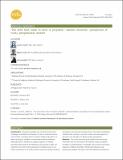Files in this item
“The word that comes to mind is polymath” : medical students’ perceptions of rural post-graduate careers
Item metadata
| dc.contributor.author | Charter, Lauren | |
| dc.contributor.author | Scully, Robert | |
| dc.contributor.author | Laidlaw, Anita Helen | |
| dc.date.accessioned | 2021-09-29T12:30:05Z | |
| dc.date.available | 2021-09-29T12:30:05Z | |
| dc.date.issued | 2021-08-20 | |
| dc.identifier | 274400124 | |
| dc.identifier | 17bba7e4-3e6a-4164-9b4f-8660368ed3e7 | |
| dc.identifier | 85114432657 | |
| dc.identifier | 000722558700020 | |
| dc.identifier.citation | Charter , L , Scully , R & Laidlaw , A H 2021 , ' “The word that comes to mind is polymath” : medical students’ perceptions of rural post-graduate careers ' , Rural and Remote Health , vol. 21 , no. 3 , 6750 . https://doi.org/10.22605/RRH6750 | en |
| dc.identifier.issn | 1445-6354 | |
| dc.identifier.other | ORCID: /0000-0003-1214-4100/work/98785437 | |
| dc.identifier.uri | https://hdl.handle.net/10023/24048 | |
| dc.description.abstract | Introduction : Physician shortages in rural and remote areas challenge accessibility and delivery of care to rural and remote communities, including within Scotland. Medical education is a reform priority to establish a sustainable medical workforce. Whilst there is evidence to support aspects of medical education that enhance the likelihood of practicing rurally, the mechanism by which these educational initiatives work is not clearly understood. This study aims to examine medical students’ perceptions of rural and remote practice, how these perceptions motivate their interest to practice rurally, and what aspects of education are thought to influence these perceptions. Methods : This cross-sectional study utilised semi-structured interviews with ten University of St Andrews medical students enrolled in undergraduate or graduate-entry medical education programmes. Feldman and Ng’s theoretical framework was deductively applied. Interviews informed additional sub-themes, which were integrated into the original framework. The final framework helped examine medical students’ perceptions of rural medicine and mechanisms which shape these perceptions. Results : Structural (countrywide) themes included geographical barriers affecting patients and physicians. Organizational themes included perceptions of inequitable allocation of resources between urban and rural areas, as well as limited staff and support in rural practices. Occupational themes included the perception of rural clinical generalists. Personal life themes included the perception of community in rural areas. Mechanisms shaping medical students’ perceptions most profoundly were their experiences (educational, personal experience, or working). Conclusions : Medical students’ perceptions align with other professionals’ reasons for staying in a particular job. Perceptions regarding rural careers included challenges due to geographical proximity to patients, resource allocation in rural areas, and the potential to sub-specialize as a general rural practitioner. Identified mechanisms, which shape perceptions, can be addressed and strengthened by educators, policy makers and Governments to optimize medical education which promotes rural recruitment and retention. | |
| dc.format.extent | 9 | |
| dc.format.extent | 739216 | |
| dc.language.iso | eng | |
| dc.relation.ispartof | Rural and Remote Health | en |
| dc.subject | Medical education | en |
| dc.subject | Rural recruitment | en |
| dc.subject | Medical curriculum | en |
| dc.subject | Graduate level training | en |
| dc.subject | LB2300 Higher Education | en |
| dc.subject | R Medicine (General) | en |
| dc.subject | 3rd-NDAS | en |
| dc.subject.lcc | LB2300 | en |
| dc.subject.lcc | R1 | en |
| dc.title | “The word that comes to mind is polymath” : medical students’ perceptions of rural post-graduate careers | en |
| dc.type | Journal article | en |
| dc.contributor.institution | University of St Andrews. Education Division | en |
| dc.contributor.institution | University of St Andrews. School of Medicine | en |
| dc.contributor.institution | University of St Andrews. Sir James Mackenzie Institute for Early Diagnosis | en |
| dc.contributor.institution | University of St Andrews. Centre for Higher Education Research | en |
| dc.identifier.doi | https://doi.org/10.22605/RRH6750 | |
| dc.description.status | Peer reviewed | en |
This item appears in the following Collection(s)
Items in the St Andrews Research Repository are protected by copyright, with all rights reserved, unless otherwise indicated.

